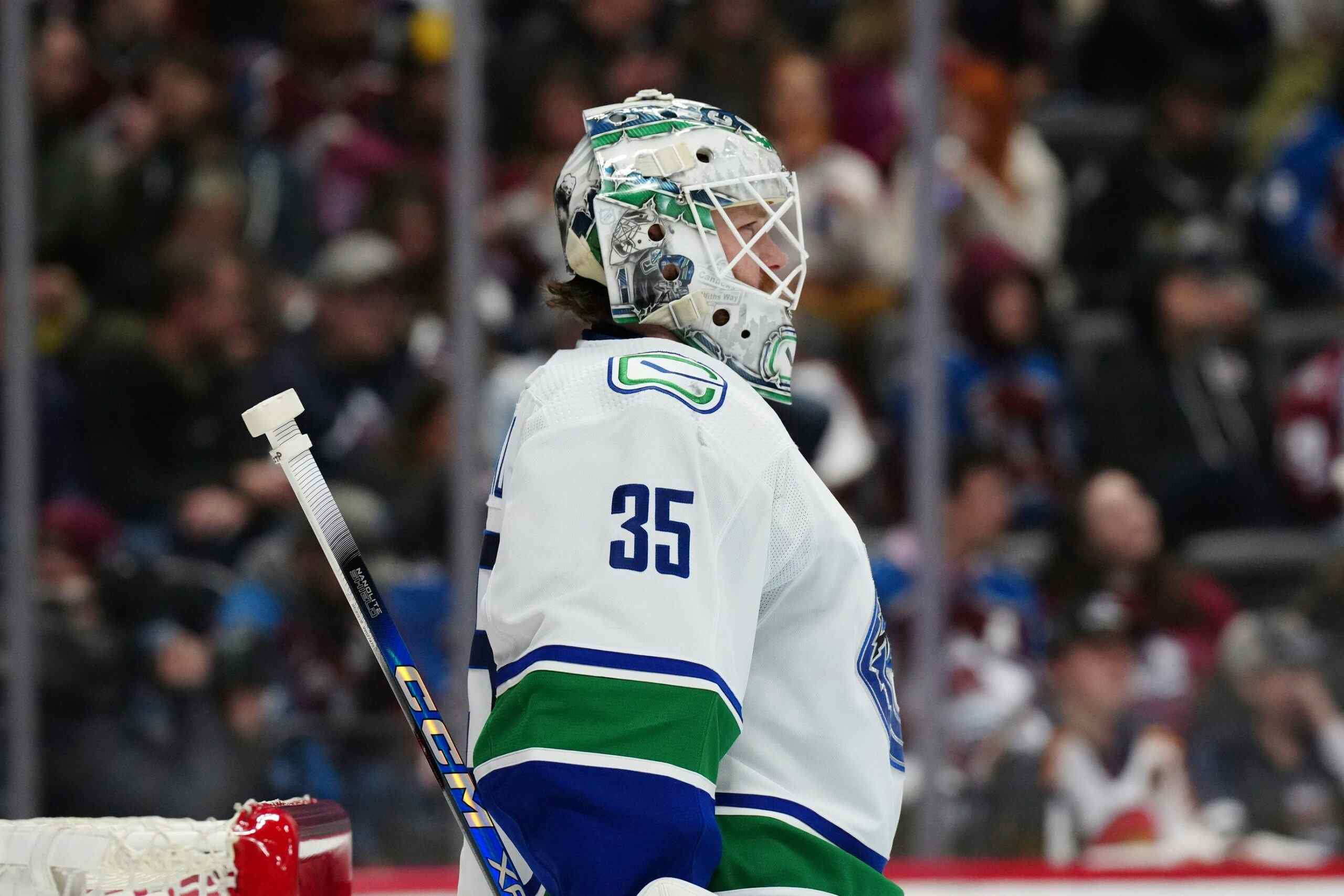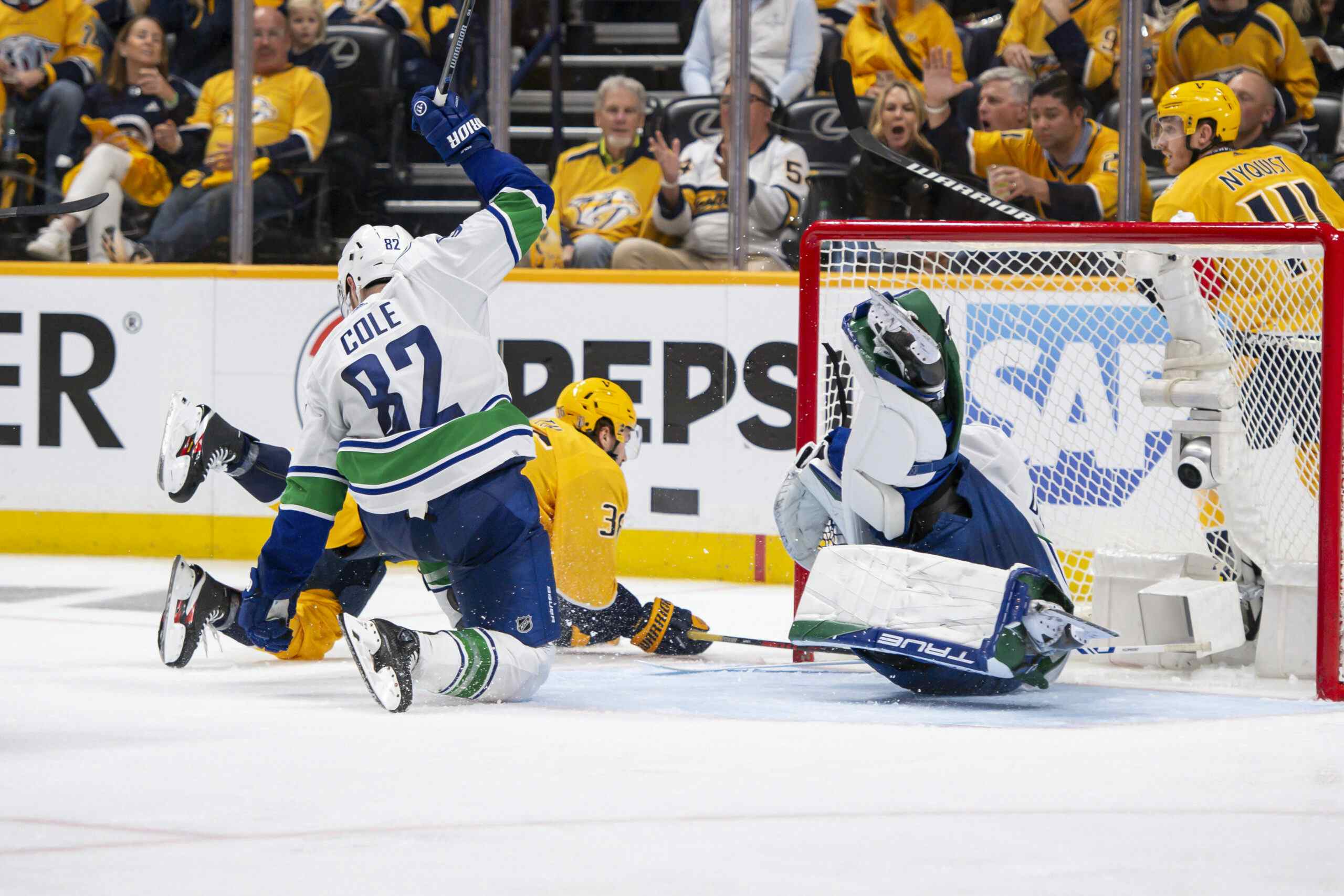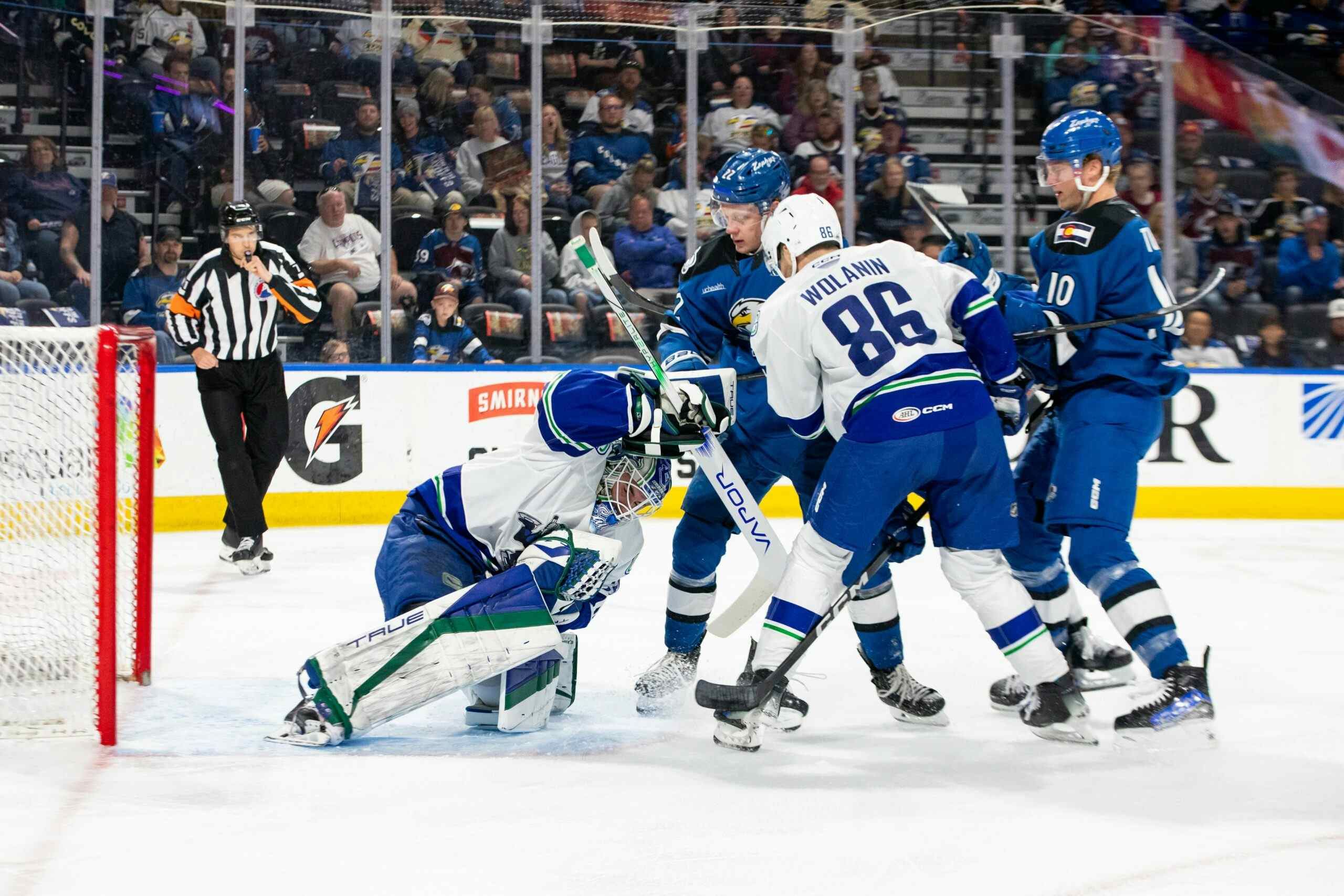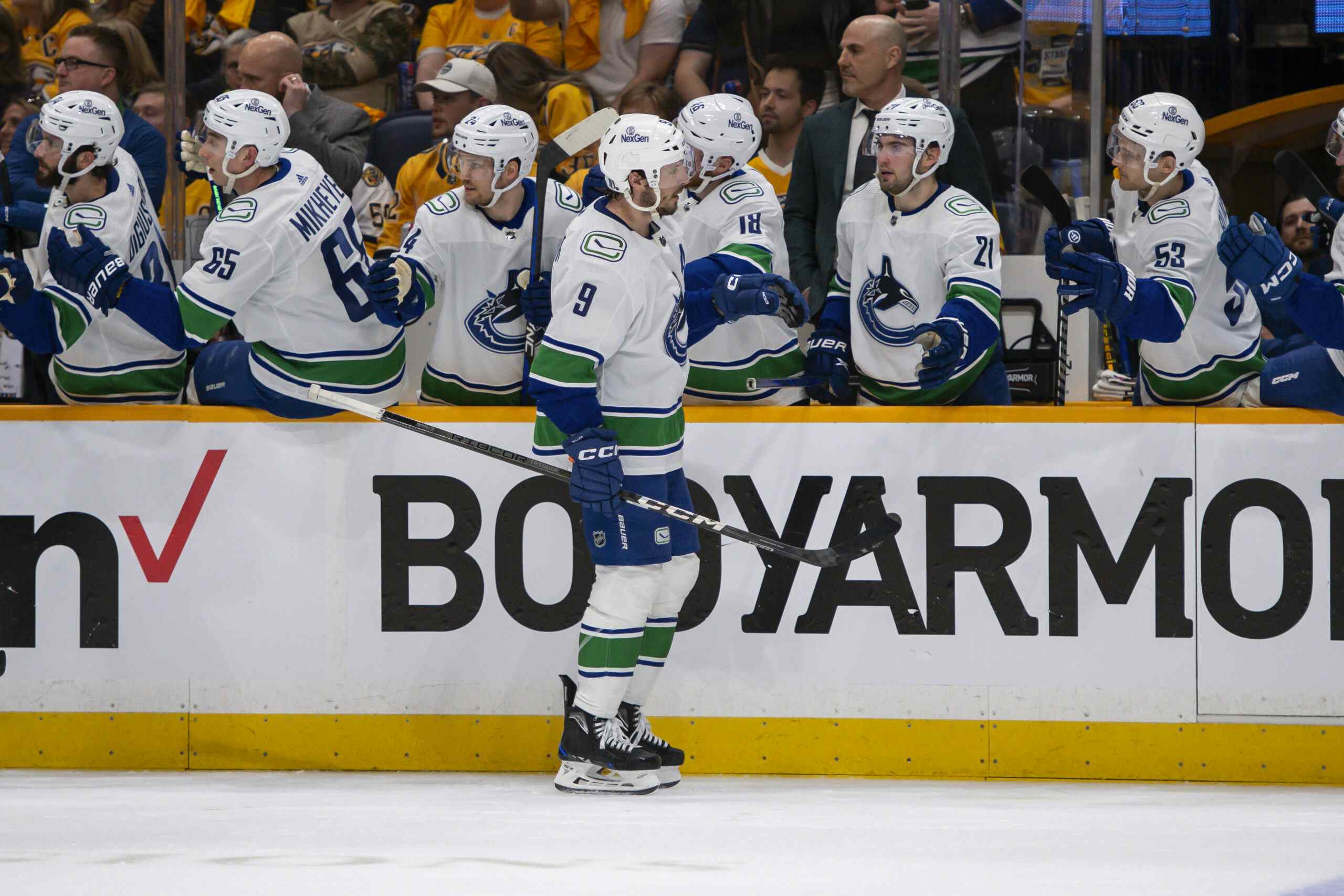The Canucks Competed Like Bastards, But Were Ultimately Still Swept By the Sharks

The handshake line can only mean one thing – a long summer ahead for the losing team.
Image Credit to Don Smith/Getty Images.
The 2013 season ended abruptly for the Vancouver Canucks on Tuesday night, after they were swept by the San Jose Sharks. While watching the Canucks play throughout the season would have quickly clued you in on the fact that this was a flawed club which resembled a shell of the team that made the Stanley Cup Finals just two years ago, I don’t think anyone expected their postseason run to be this short. They’re officially the first team to get bounced from the playoffs, and the only one out of the 16 entrants to fail to win a single game.
There will surely be plenty of time in the coming months to talk about future moves, and potential solutions to fix this team. But for now, let’s settle for taking a closer look at what happened in Game 4, and nailing down what exactly caused the Canucks to be sent packing.
Click Past the Jump for More In-Depth Analysis, and the Scoring Chance Totals.
Who and/or what’s to blame?
You’ll probably get varying answers depending on who you ask; I’m sure that social media, television and radio personalities, bloggers, your friends, or even random strangers at the grocery store will all have their own conspiracy theories and beliefs as to what was behind the Canucks’ undoing. Unfortunately, I can already tell that the most common scapegoats will be some combination of the goaltending, the officiating, and the coaching. Sure, I’d say that each of those played some part in the team’s playoff exit. But if you truly believe that any of those three are the major reason that the team lost, then you’re missing the plot.
In Tuesday’s elimination game, the Canucks were out-chanced by a margin of 28-7, including a second period in which they literally did not record a single chance. That means that in the final two games of the series, they gave up 54(!) scoring chances, while registering just 14 of their own. Usually when that happens, you lose. And you deserve to lose.
I’ll conceed that the officiating was definitely suspect, nearly all the way throughout the series. The Sharks – the league’s 7th most efficient power play throughout the regular season, converting 20.1% of the time – received 24 power plays, and 35:16 of overall ice-time with the man advantage. The Canucks on the other hand, had just 10 power plays, combining for a grand total of 15:36 with the extra attacker. That is easily the most lopsided differential out of any of the first round matchups. Ray Ferraro had a great quote on commentary today, which was, "from a Vancouver standpoint you have to feel like any time there has been a 50/50 call, it has gone against you. They have to be furious." It sure seemed that way, didn’t it?
In this particular game, there were two rather suspect calls that ultimately wound up deciding the game. The first was Kevin Bieksa’s cross-checking penalty with 5:01 left in the game, and the Canucks clinging to a 3-2 lead. I personally thought that it was a rather soft call, especially given the circumstances. At the same time, he did extend both arms as he followed through on Wingels’ back, and former referee Kerry Fraser agreed with the call when he made his appearance on TSN’s panel. Sure enough, the Sharks converted just 34 seconds later. Then came the Daniel Sedin "boarding" penalty in overtime, which I thought was way more dubious. It appeared to be a good, strong, shoulder-to-shoulder hit. We see that exact play all the time. Anyways, you’ll never believe this, but the Sharks scored 15 seconds later to win the game.
However, what it all boils down to is that I have a difficult time saying that the Vancouver Canucks lost this game, or this series because of some sort of officiating conspiracy against them. They were rather thoroughly outplayed, and outclassed, and the Sharks took advantage of their power play opportunities. The Sharks generated 35 scoring chances with the man advantage, looked absurdly dangerous nearly every time their top unit was out there, and wound up scoring 7 power play goals. Is it the officiating team’s fault that the Canucks simply had no answer all series long?
Let’s get back to Bieksa, whose performance will unfortunately likely be remembered for the aforementioned penalty that led to the Sharks tying it up. Which really is a shame, because he played a heck of a game. He led both teams in ice-time with 33:33 (nearly 3 minutes more than anyone else), played a key part in Alex Burrows’ power play goal by chipping in with a timely pinch to keep the puck in the offensive zone, and even prevented a sure-fire goal by blocking a Joe Thornton shot with a yawning cage behind him. In the Game 3 recap, I called him out for his horrible play, which I thought was justified at the time. And while it looked pretty clear that he was dealing with some sort of injury throughout the series, he failed to use that as an excuse in an interview after the game. I respect the hell out of him, even if his uneven play drives me crazy every so often.
Up front, Alain Vigneault finally relented, and started the game with Sedin-Sedin-Kassian, Raymond-Kesler-Burrows, Hansen-Roy-Higgins. That 2nd line was extremely feisty throughout, and wound up generating the team’s only 2 even strength goals. Burrows played easily his best game of the series, which was bittersweet, because it was difficult to watch his performance without wondering where the heck it had been for the 3 prior games. Raymond did a lot of good things in what was likely his final game as a Canuck, which is so classic Mason Raymond; you give up on him, he shows you flashes that make you want to believe there’s something legitimately there, before he inevitably disappoints you once again. There’s always going to be someone that bites on that potential, though.
I’m not even going to waste any space on this platform on Derek Roy right now, because it’s not worth it. He was a complete abomination in all 4 games, and quite frankly I’m convinced he took that dumb boarding penalty in the 1st period just to remind people that he was actually participating in this series. He’s a UFA this summer, but even with his stinkbomb, he will surely still get handsomely paid because of how barren the crop of free agents is.
I was disappointed by the way the Sedins and Kassian played while they were together in this one. The experiment was fairly short-lived, as desperation caused Vigneault to replace Kassian with Hansen, which actually worked. Once those three were put together the Sedins came alive, and spent a large chunk of time in the offensive zone. In the midst of all of that, they put vintage Sedinery on display in setting up Alex Burrows’ goal. That entire play was a thing of beauty. Unfortunately Hansen got injured on a hit by Raffi Torres, and didn’t play in the overtime session.
Which finally brings us to Schneider, who will be skewered by fans and media for the way in which he mishandled the final two goals. He seemed to have a chance to corral both, but couldn’t, and obviously that wound up costing both him and the team. He started the game off a little shaky, and seemed to be fighting the puck. But I just don’t understand how you can pin this loss on a guy that stopped 43 of 47 shots he faced, a large chunk of which were quality chances. When you feel the need to rip Schneider’s performance, just remember the 2nd period in this one. His team was down 2-1, and 6 full minutes were spent shorthanded. He made some seriously high quality saves while facing 10 scoring chances (with his teammates being unable to generate a single one on the other end), and kept it at a 1-goal deficit, giving the Canucks a chance to make their run in the 3rd period. Without his play, this game gets out of hand in a hurry in that dreadful middle frame.
The Canucks channeled their inner Jon Snow and really competed like bastards, but it wasn’t enough. Blame the goaltending, blame the officiating, and blame the coaching all you like. The fact of the matter is that at the end of the day the Vancouver Canucks were eliminated from the 2013 playoffs by a superior hockey team.
Scoring Chance Data
A chance is counted any time a team directs a shot cleanly on-net from within home-plate. Shots on goal and misses are counted, but blocked shots are not (unless the player who blocks the shot is “acting like a goaltender”). Generally speaking, we are more generous with the boundaries of home-plate if there is dangerous puck movement immediately preceding the scoring chance, or if the scoring chance is screened. If you want to get a visual handle on home-plate, check this image.
Scoring Chance Totals:
| 1st Period | 2nd Period | 3rd Period | Overtime | Totals | |
|---|---|---|---|---|---|
| Canucks (EV) | 4 (3) | 0 !! | 3 (2) | 0 !! | 7 (5) |
| Sharks (EV) | 5 (2) | 10 (4) | 7 (5) | 6 (4) | 28 (15) |
Individual Chance Contributions:
| Individual | Chances Taken | Chances Assisted | Chances Total |
|---|---|---|---|
| Dan Hamhuis | 2 | 0 | 2 |
| Daniel Sedin | 1 | 1 | 2 |
| Derek Roy | 2 | 0 | 2 |
| Alex Burrows | 1 | 0 | 1 |
| Mason Raymond | 1 | 0 | 1 |
| Jannik Hansen | 0 | 1 | 1 |
Individual Scoring Chance Differential:
| Individual | EV F – A | PP F – A | SH F – A | Total F – A |
|---|---|---|---|---|
| Henrik Sedin | 2-11 | 1-0 | 0-1 | 3-12 |
| Daniel Sedin | 2-10 | 1-0 | 0-0 | 3-10 |
| Alex Burrows | 1-6 | 1-0 | 0-10 | 2-16 |
| Ryan Kesler | 1-3 | 1-0 | 0-9 | 2-12 |
| Jannik Hansen | 4-1 | 1-0 | 0-2 | 5-3 |
| Mason Raymond | 1-4. | 1-0 | 0-1 | 2-5 |
| Chris Higgins | 2-3 | 0-0 | 0-2 | 2-5 |
| Derek Roy | 2-1 | 1-0 | 0-1 | 3-2 |
| Steve Pinizzotto | 0-1 | 0-0 | 0-0 | 0-1 |
| Max Lapierre | 0-4 | 0-0 | 0-0 | 0-4 |
| Dale Weise | 0-1 | 0-0 | 0-0 | 0-1 |
| Zack Kassian | 0-4 | 0-0 | 0-0 | 0-4 |
| Dan Hamhuis | 4-8 | 1-0 | 0-3 | 4-11. |
| Jason Garrison | 3-3 | 1-0 | 0-7 | 4-10. |
| Alex Edler | 1-4 | 0-0 | 0-7 | 1-11 |
| Kevin Bieksa | 2-7 | 1-0 | 0-8 | 3-15 |
| Frank Corrado | 0-4 | 0-0 | 0-0 | 0-4 |
| Andrew Alberts | 0-3 | 0-0 | 0-0 | 0-3 |
External Resources
Recent articles from Dimitri Filipovic





